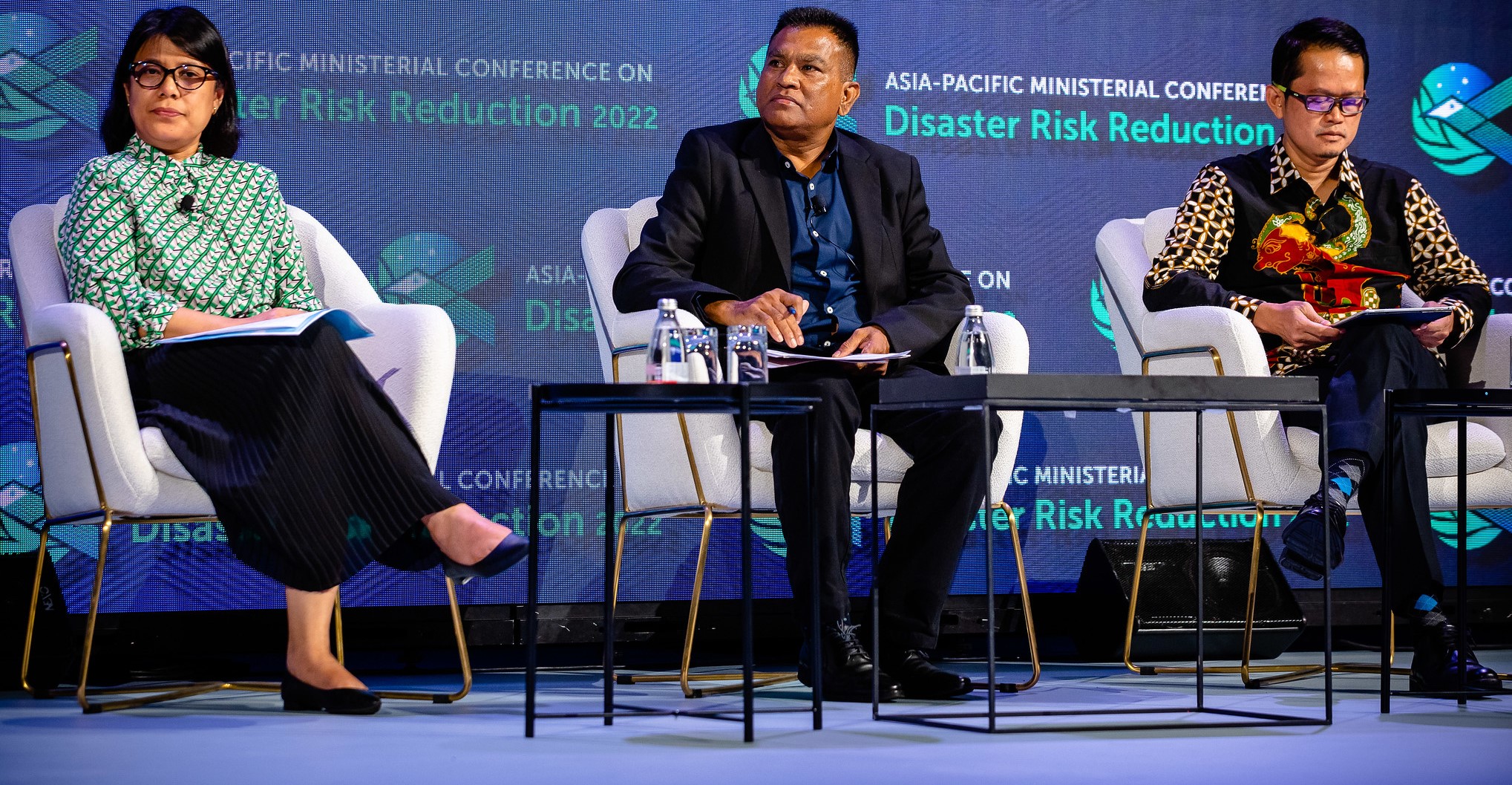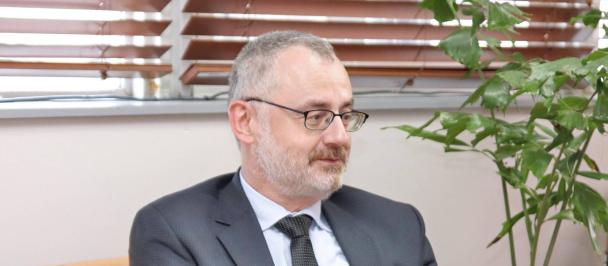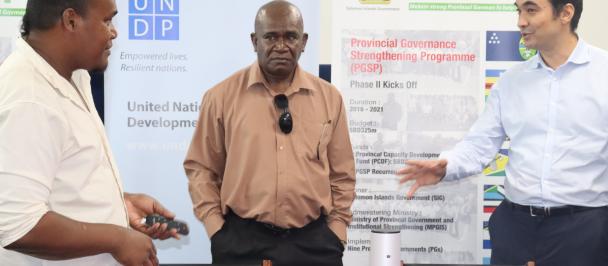Technology does not discriminate
October 24, 2022

Shailendra Prasad, Head of eCommerce and Digital Financial Services at Vodafone Fiji (middle), speaking at the 2022 Asia-Pacific Ministerial Conference on Disaster Risk Reduction in Brisbane, Australia last month.
The use of digital solutions to enhance the delivery of adaptive social protection (ASP) schemes following a natural disaster has been deemed critical for resilience-building and disaster preparedness in the Pacific.
ASP schemes are gaining prominence in disaster-prone regions, such as the Pacific, as effective tools to help vulnerable local communities better manage and overcome the adverse impacts of climate hazards.
These schemes are typically designed to uplift socially and economically disadvantaged people and include a combination of financial, policy and programmatic interventions to that end.
However, delivering the schemes to the most vulnerable and hard to reach communities has been a challenge that experts, development agencies, governments and the private sector have had to contend with for some time.
This is where technology, if used effectively, can help, according to Shailendra Prasad, Head of eCommerce and Digital Financial Services at Vodafone Fiji.
Mr. Prasad spoke about the potential for technology to enhance the delivery of ASP during a panel discussion at the Asia-Pacific Ministerial Conference on Disaster Risk Reduction in Brisbane, held from September 19-22.
Over 3,000 delegates attended the conference, co-hosted by the Australian Department of Foreign Affairs and Trade and the UN Office for Disaster Risk Reduction, and held in person for first time since 2019.
Technology, Mr. Prasad said, has helped overcome issues of remoteness and been a powerful enabler of social protection in the Pacific “because it does not discriminate against anybody.”
“It’s a great equaliser provided there is equal access and inclusion.”
The examples he cited included the Fijian government’s use of mobile money to disburse social welfare payments after natural disasters and during the COVID pandemic.
Capitalising on the convenient access and reach provided by digital wallets, Vodafone Fiji and the UN Capital Development Fund (UNCDF) have partnered to make climate insurance more accessible in the region using the same technology.
M-PAiSA
Vodafone Fiji, with support from UNCDF’s Pacific Financial Inclusion Programme, launched the country’s first mobile money service in 2010 known as M-PAiSA.
While launching M-PAiSA, the Fijian Prime Minister, Voreqe ‘Frank’ Bainimarama, said it would enable “unbanked, non-saving and geographically isolated Fijians to participate in the mainstream financial sector of our country.”
According to Mr. Prasad, these goals have been met and M-PAiSA has helped in closing the financial inclusion gap through a cashless ecosystem.
More than 380,000 people, from a population of 900,000, use the product today for a range of services, including purchasing goods and services, sending, and receiving remittances, local money transfers, utility bill payment and storing digital funds.
One of M-PAiSA’s more important use cases became apparent at the height of the COVID-19 pandemic in 2020/2021 when the Fijian Government used the platform – alongside Digicel’s MyCash - to disburse nearly FJ$200 million in welfare payments to those most affected by the pandemic.
“During the pandemic, in lockdown, it [M-PAiSA] provided a lifeline to many Fijians and complemented government’s efforts of providing social protection through cash assistance,” Mr. Prasad said.
“It all took less than a minute to send money to 300,000 people across the country – directly to their mobile phones.”
The entire process was transparent and fair, he added, with all payments creating a digital trail that could be audited and traced for accountability.
The identity of recipients could also be verified given the know-your-customer (KYC) needs that come as a registration requirement when purchasing a sim card.
These features engendered efficiency and fairness by removing the risk that people would receive payments twice and resulted in a more equitable distribution of funds, Mr. Prasad said.
“When you are able to provide cash assistance through mobile wallets… then without discriminating, you are able to provide assistance to whoever, wherever [they are] because technology doesn’t really discriminate against anybody,” he added.
PICAP-Vodafone Partnership
UNCDF’s Pacific Insurance and Climate Adaptation Programme (PICAP) has partnered with Vodafone and Digicel to use mobile money technology for the easy and efficient processing of insurance payouts.
The Programme has developed and deployed the region’s first disaster risk parametric micro-insurance product to the Fiji market that offers protection against cyclone and flood-related damage.
Insurance payouts are triggered based on pre-determined ‘trigger’ events, such as a minimum level of rainfall or the strength of a cyclone, with no need for verification of losses for funds to be disbursed.
Through Vodafone and Digicel’s mobile money wallets, payments will reach policy holders within the first 7-14 days following a ‘trigger’ event, making climate risk insurance more accessible to low-income groups in Fiji.
This is a critical period during which funds are required to meet immediate needs such as purchasing food, repairing homes, or reviving a business.
“In the Pacific small island developing states with highly dispersed populations, enabling digital access is the cost-effective way of reaching the remote communities and the last mile,” said Krishnan Narasimhan, UNCDF Lead Specialist (Climate Risk Insurance) and PICAP Programme Manager.
“UNCDF has partnered with Vodafone in Fiji, Vanuatu and other countries to make this possible by setting up innovation projects for testing and scaling frontier solutions.”
The Programme is jointly implemented by UNCDF, the UN Development Programme and the UN University Institute for Environment and Human Security and is supported by the Governments of New Zealand, Australia, and Luxembourg.
Working Together
At the conference, Mr. Prasad said there was a strong business case for the private sector to support efforts to help communities recover quicker from natural disasters.
“One of the things as a business we have realized is that in small market economies the number of customers is very limited. The sooner the population can recover from disasters, the sooner we can recover as a business,” he said.
“There is inter-dependency for mutual survival. The strength of our customers is also our strength and if we can support them recover quickly, then we are also able to recover as a business and continue to do business.” But technology is only one aspect of disaster risk reduction.
According to Mr. Prasad, public and private stakeholders need to work closely together for such initiatives to bear fruit over the long term.
“Private-public partnerships are very important. We need to collaborate,” he said.
“We need to leverage the strengths of the different players -- government, private sector -- to not replicate and waste resources but use the resources at our disposal in a most effective and efficient way.”

 Locations
Locations


